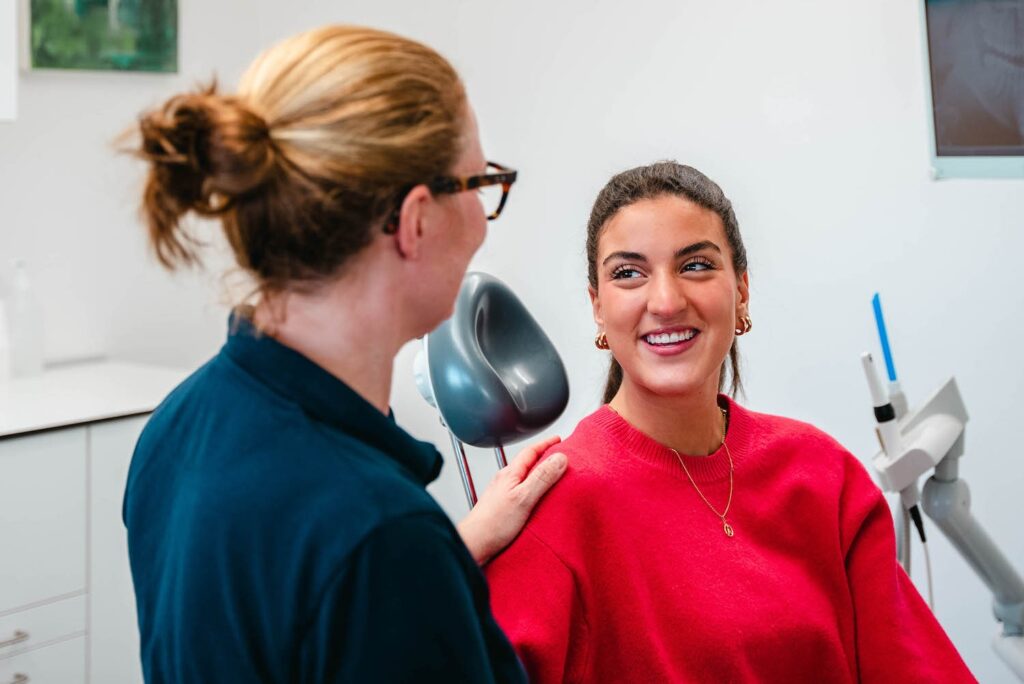Chills in the teeth
It causes a twinge or brief pain when you drink something cold/hot or eat something sweet or sour. Teeth icing is a common phenomenon that in most cases is caused by the dentine being exposed.
With Invisalign, you can get the smile you dream of. The braces are both transparent and removable, so the straightening process is as discreet as possible.
At Tandliv, we have specialized certification from Invisalign, so you and your teeth are in the best hands.

- We welcome you to our two cozy dental clinics in Copenhagen.

- We give you a great dental experience with professional expertise and personal care at the forefront
Dentin and icing in teeth
A tooth consists of several layers, each with an important function.
On the crown of the tooth is the enamel and on the root of the tooth is the cementum. These two hard layers protect the innermost part of the tooth - the dentin and pulp.
Dentin surrounds the nerve of the tooth and is more sensitive than enamel. In the center of the tooth is the pulp, which is located in the so-called pulp chamber. This is where the tooth's nerves and blood vessels are located.
We can't feel anything from the enamel or cement - but when the dentin or pulp is affected, it can cause pain or icing.
What causes icing in the teeth?
Inside the tooth is dentin, which contains microscopic, fluid-filled channels that connect the outside of the tooth to its interior. When dentin is protected by enamel, you rarely experience discomfort - as enamel does not conduct cold and heat very well.
However, if the dentin becomes exposed, for example due to wear or receding gums, the tooth becomes sensitive. Temperature changes and certain foods can alter the flow of fluid in the dentine canals and cause sharp, short-term pain in the tooth - what we often experience as icing.
Particularly sweet or acidic foods can irritate the sensitive areas and lead to toothache. Many people experience this especially with cold drinks or when brushing near the gum line.
A common cause is what is known as sensitive necks. Here, the gums have receded, exposing the neck of the tooth, which is not covered by enamel - and therefore reacts strongly to external influences.

Exposed and sensitive dental necks
When the gums recede, the neck of the tooth can become exposed. Here, the tooth is not protected by enamel and is therefore sensitive to cold, heat and touch. This can cause icing, pain in the tooth or a brief, sharp toothache - especially with cold drinks or tooth brushing.
The condition is called sensitive necks and is very common.
What can you do yourself?
- Use anti-icing toothpaste that is gentle and contains extra fluoride.
- Apply a little toothpaste directly to the sensitive area - preferably before bedtime.
- Brush with a soft toothbrush and avoid brushing too hard.
If icing continues, we recommend that you have it checked by your dentist. In some cases, treatment may be necessary to protect the exposed tooth necks.

Enamel damage on teeth
Chipping can occur if the enamel is worn away - either by brushing too hard (abrasion) or by exposure to acidic foods and drinks (erosion). Without enamel protection, the dentin is exposed and can cause tooth pain.
What can you do yourself?
- Avoid harsh brushing: Brush gently and with a soft toothbrush that doesn't wear down enamel or irritate gums.
- Choose gentle products: Avoid toothpaste with high abrasives if you have sensitive teeth.
- Ask your dentist for advice: If you are unsure about your brushing technique or toothbrush, we are happy to help you with personal guidance.
Visit our dental clinics in Copenhagen
Do you want to be a patient in a Copenhagen dental clinic where we take both your dental health and trust seriously?
Contact one of our two dental clinics today and book a consultation. We look forward to welcoming you in a safe and trustworthy environment.
Book an appointment with Tandliv



- We focus on the good experience.
Cracked or broken teeth
A broken tooth and cracks in the tooth may not always be visible to the naked eye, but can cause icing in the teeth as the dentin is exposed. Both conditions require a trip to the dentist. Do you suffer from dental fear? At Tandliv, we specialize in dental anxiety.
Here you can also read about → tips from the Danish Dental Association.

Pain after repositioning or new filling
It's normal to experience temporary icing or pain in the tooth after getting a filling. Both plastic and silver amalgam can conduct cold and heat towards the dentin, causing discomfort.
The depth of the filling often matters - the deeper, the greater the sensitivity. The discomfort usually subsides gradually and goes away on its own.
If the discomfort persists or worsens, you should contact your dentist so we can make sure everything is as it should be.
Read more about why you can get ice in your teeth on netdoktor.dk.
Contact us and get advice
If you have any doubts or questions, don't hesitate to contact us.
FAQ - Teeth icing
Tooth icing often occurs due to dentin hypersensitivity. When the tooth enamel wears away or the gums recede, the dentin, which contains small channels (tubules) connected to the tooth's nerve, becomes exposed. Cold, heat, sweet or sour foods and drinks, and pressure can stimulate these nerves and cause a sharp, short-term pain known as icing. Other causes can include tooth cavities, cracks, worn fillings or gum disease.
Depending on the cause and severity, it may be necessary to treat tooth icing. If the icing is due to tooth cavities, cracks, worn fillings or gum disease, it's important to seek dental care to address the underlying issues. For dentin hypersensitivity, you can try using sensitive toothpaste and soft brushing, but if icing persists or worsens, you should consult your dentist to discuss further treatment options.
To avoid icing your teeth, follow these tips:
1) Brush gently with a soft toothbrush and fluoride toothpaste.
2) Use toothpaste for sensitive teeth.
3) Avoid scrubbing your teeth hard and avoid brushing too aggressively.
4) Cut down on acidic and sugary foods and drinks.
5) Visit your dentist regularly and follow their recommendations for good oral hygiene and treatment of any existing tooth or gum problems.

- I look forward to meeting you in the clinic.
- Dentist
Born 1974, graduated from the University of Copenhagen from the Department of Odontology at the School of Dentistry in 2004. Experienced dentist who has taught at the School of Dentistry in Copenhagen in gum disease and performs special treatments in periodontal disease.
Zohair has also published an article in Tandlægebladet about "periodontitis juvenilis", which can be read here or on the website of the Odontological Institute.
Contact Tandliv for questions
Do you have questions about icing on teeth, prices or the treatment process?
Contact Tandliv today and get answers to your questions.

